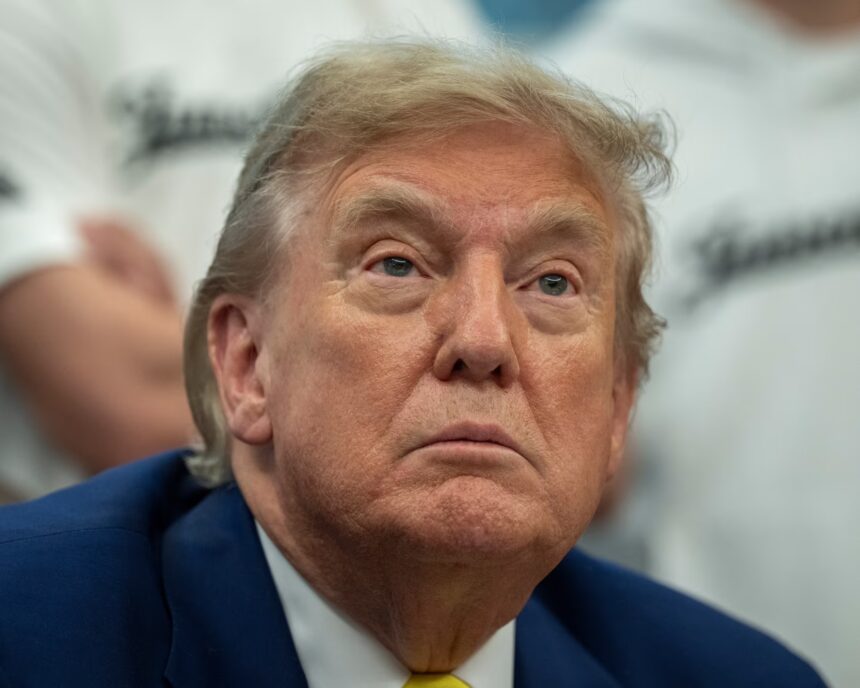Trump Denies Report of Approved Strike on Iran
Former President Donald Trump has firmly denied claims made by the Wall Street Journal that he approved a US military strike plan against Iran. Speaking through his press secretary, Trump declared the newspaper had “no idea” about his strategy on the evolving Israel-Iran conflict. He emphasized that no final decision has been made, and a verdict will be reached within two weeks.
Controversial Report Sparks Trump’s Rebuttal
According to the Journal, Trump allegedly informed advisors that he approved plans to attack, contingent on whether Tehran would abandon its nuclear ambitions. The report referenced unnamed sources, stirring immediate reaction from the Trump camp. He fired back on Truth Social: “The Wall Street Journal has No Idea what my thoughts are concerning Iran!”
Military Focus on Fordow Underground Facility
The focus of US military deliberation centers around the Massive Ordnance Penetrator (MOP), a “bunker-buster” bomb designed to strike fortified underground sites. The specific target is Fordow, Iran’s deeply buried uranium enrichment facility, which Israel cannot destroy without US support. The US, unlike Israel, possesses aircraft capable of delivering the GBU-57—a 13.6-ton bomb capable of penetrating reinforced mountains.
Readiness Versus Necessity in Military Planning
A senior official told Axios that while the US is “ready to strike Iran,” the administration still questions whether such a move is necessary. “We want to be unnecessary,” the official stated, hinting that the strike may be avoidable if negotiations with Tehran yield diplomatic progress.
Concerns Over MOP’s Effectiveness and Nuclear Options
Internal discussions within the Pentagon and among Trump’s cabinet have revealed skepticism about the effectiveness of conventional bombs like the MOP in neutralizing Fordow. The underground facility’s depth may require a tactical nuclear weapon to fully destroy, two defense officials reportedly told The Guardian.
Trump Cites Potential for Negotiation in Delayed Decision
During a Thursday press briefing, Trump’s press secretary Karoline Leavitt quoted the president: “Based on the fact there’s a substantial chance of negotiations, that may or may not take place with Iran in the near future, I will make my decision whether or not to go within the next two weeks.”
Deliberate Ambiguity as Decision Looms
Just a day earlier, Trump himself had remarked: “I have ideas on what to do but I haven’t made a final – I like to make the final decision one second before it’s due.” His language signaled a still-evolving calculus, with timing left deliberately ambiguous: “I may do it, I may not do it. The next week is going to be very big, maybe less than a week.”
Iran’s Defiant Response at the United Nations
Iran has made its position crystal clear. In a bold statement to the United Nations, the Iranian mission stated: “Iran does NOT negotiate under duress, shall NOT accept peace under duress, and certainly NOT with a has-been warmonger clinging to relevance.”
Israel Praises Trump Amid Rising Tensions
While Washington weighs its options, Israel has stepped up its rhetoric. Israeli Prime Minister Benjamin Netanyahu praised Trump, calling him “a great friend of Israel” and thanked him “for standing by us” amid the rising regional tensions.
US Military Buildup and Citizen Warnings
The US military presence in the Middle East has notably expanded. The Pentagon has deployed multiple warships, including three Navy destroyers and two carrier strike groups. The State Department has also issued warnings to US citizens, advising them to exit the region as security threats loom.
MAGA Base Split Over Middle East Involvement
The Republican front-runner’s denial of the Journal’s report has come at a time of growing debate within the Make America Great Again (MAGA) base. Influential voices like Tucker Carlson and Steve Bannon have warned against involvement in another Middle Eastern conflict, which they argue would contradict the movement’s “America First” ideology.
Carlson Apologizes, Bannon Calls for Direct Address
Carlson, known for his fiery commentary, reportedly called Trump to apologize after saying the former president “is complicit in an act of war.” Trump acknowledged the apology: “Tucker’s a nice guy. He called and apologized the other day because he thought he said things that were a little bit too strong, and I appreciated that.”
Bannon, meanwhile, believes Trump could regain doubters if he directly addressed the public on the issue of military engagement with Iran. This internal debate highlights a rift within Trump’s coalition as it navigates between geopolitical aggression and domestic populism.
Uncertainty as Global Stakes Rise
With a possible US strike looming, and Trump leaving the final call pending, the world watches closely. His next move could redefine America’s posture in the Middle East, reshape US-Iran relations, and potentially spark a broader regional conflict—or prevent one entirely.






